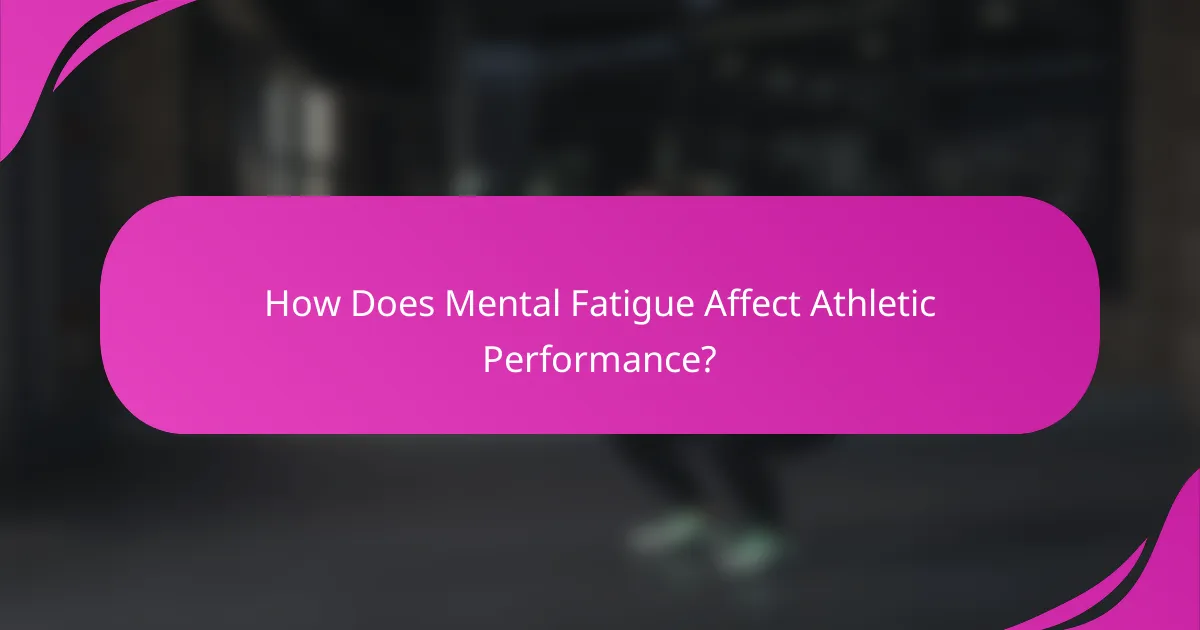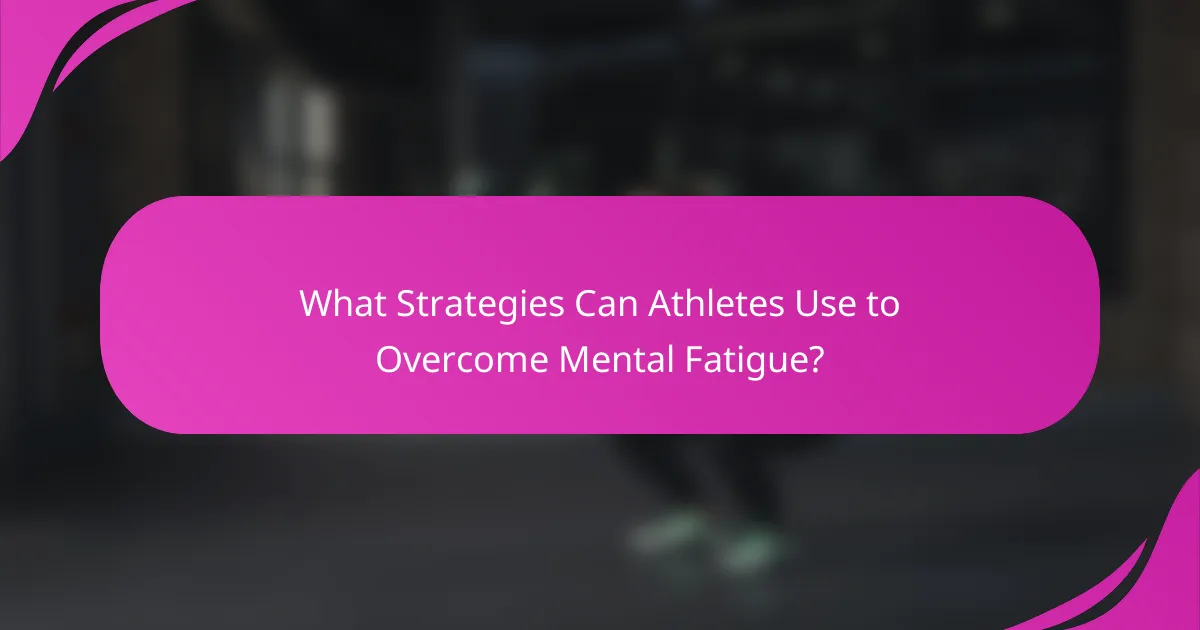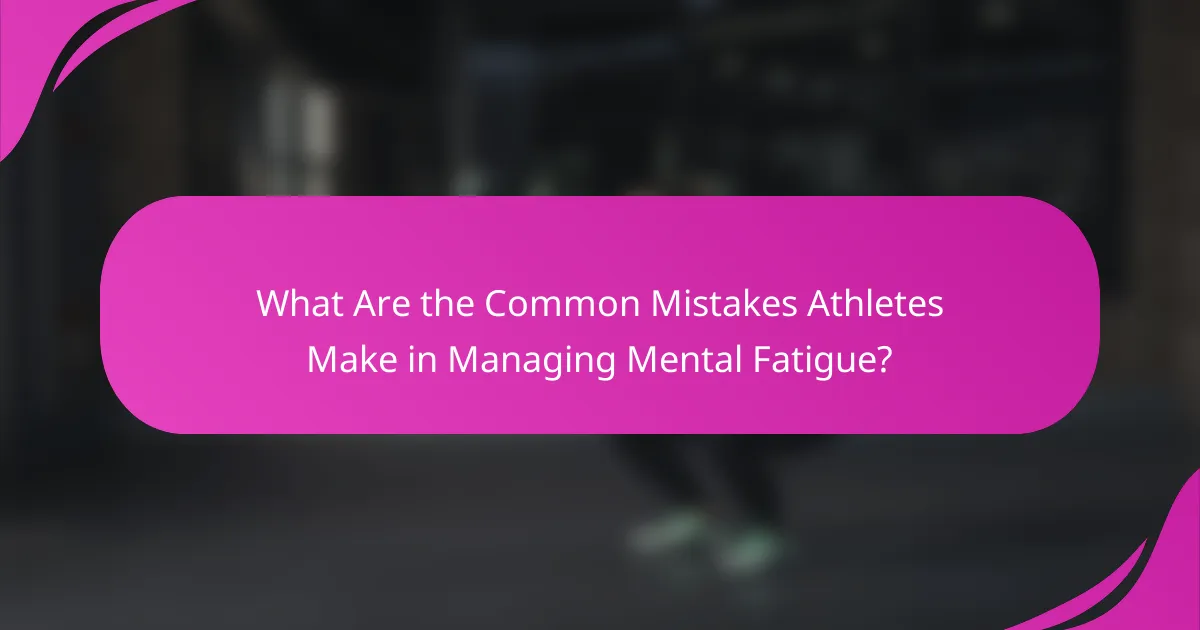Mental fatigue can severely impact athletic performance, reducing focus and motivation. This article explores the effects of mental fatigue on recovery, highlights cognitive restructuring techniques, and emphasizes the importance of mindfulness practices. Athletes will learn how to enhance their mental resilience and prioritize mental health for improved performance. Structured rest and regular mental health check-ins are also discussed as vital components of recovery.

How Does Mental Fatigue Affect Athletic Performance?
Mental fatigue significantly hinders athletic performance by reducing focus, motivation, and reaction time. Athletes experiencing mental fatigue may struggle with decision-making and physical execution, leading to suboptimal results. Research indicates that mental fatigue can decrease performance by up to 20%, emphasizing its impact on training and competition. Strategies such as mindfulness and cognitive restructuring can help athletes manage mental fatigue, enhancing recovery and overall performance.
What are the signs of mental fatigue in athletes?
Mental fatigue in athletes manifests through signs like decreased motivation, increased irritability, and impaired concentration. These symptoms can hinder performance and recovery. Athletes may also experience physical symptoms such as sleep disturbances and heightened anxiety. Recognizing these signs early is crucial for effective recovery strategies.
How does mental fatigue differ from physical fatigue?
Mental fatigue primarily affects cognitive functions, while physical fatigue impacts muscle performance. Mental fatigue can result from prolonged cognitive tasks, leading to decreased motivation and focus. In contrast, physical fatigue arises from exertion, causing muscle tiredness and a need for physical rest. Both types of fatigue can hinder athletic recovery, but addressing mental fatigue through mindset changes can enhance overall performance and resilience.
What impact does mental fatigue have on decision-making in sports?
Mental fatigue significantly impairs decision-making in sports by reducing focus and increasing reaction times. Athletes experiencing mental fatigue may struggle to assess situations accurately, leading to poor choices during critical moments. Research indicates that mental fatigue can diminish cognitive flexibility, making it harder to adapt strategies in competitive environments. As a result, managing mental fatigue is essential for optimal athletic performance and recovery.

What Strategies Can Athletes Use to Overcome Mental Fatigue?
Athletes can overcome mental fatigue by implementing cognitive restructuring techniques. These strategies include positive self-talk, visualization of success, and mindfulness practices. Positive self-talk replaces negative thoughts with empowering affirmations, enhancing confidence. Visualization allows athletes to mentally rehearse their performance, reinforcing focus and reducing anxiety. Mindfulness practices, such as meditation, help in managing stress and maintaining present-moment awareness, which can improve overall mental resilience.
How can cognitive restructuring help in recovery?
Cognitive restructuring aids recovery by changing negative thought patterns that contribute to mental fatigue. This process enhances resilience, improves focus, and fosters a positive mindset essential for athletic performance. By identifying and challenging irrational beliefs, athletes can cultivate a more constructive perspective, leading to better recovery outcomes. Research shows that cognitive restructuring can significantly reduce anxiety and improve overall mental well-being, making it a valuable tool in athletic recovery strategies.
What is cognitive restructuring?
Cognitive restructuring is a psychological technique aimed at changing negative thought patterns. This method helps athletes overcome mental fatigue by reframing their mindset, enhancing recovery. By identifying and challenging irrational beliefs, individuals can foster a more positive outlook, leading to improved performance and emotional well-being. Cognitive restructuring often involves techniques such as journaling, cognitive reframing, and guided imagery to facilitate this transformative process.
How to implement cognitive restructuring techniques?
To implement cognitive restructuring techniques, identify negative thoughts and challenge their validity. Use evidence to replace them with positive, realistic alternatives. Practice this consistently to reshape your thinking patterns, enhancing mental resilience and supporting athletic recovery.
What role does visualization play in recovery?
Visualization significantly enhances recovery by fostering a positive mindset. It helps athletes mentally rehearse successful performance and cope with mental fatigue. Engaging in visualization techniques can lead to reduced anxiety and improved focus, which are critical during recovery phases. Research indicates that athletes who visualize their recovery process experience quicker healing and better performance outcomes. This unique attribute of visualization as a mental tool is essential for overcoming mental fatigue in athletic recovery.
What are effective visualization techniques for athletes?
Visualization techniques for athletes enhance focus and reduce mental fatigue. Effective methods include mental imagery, where athletes visualize successful performance, and guided imagery, which involves relaxation and positive visualization. Another technique is the use of video analysis, allowing athletes to mentally rehearse movements. Lastly, setting specific mental goals can direct focus and motivation, aiding in recovery and performance improvement.
How can mindfulness practices contribute to mental recovery?
Mindfulness practices significantly enhance mental recovery by reducing stress and improving focus. Techniques such as meditation and deep breathing promote relaxation, which aids in mental clarity and emotional resilience. Regular mindfulness can lower anxiety levels, leading to better decision-making in athletic performance. Studies show that athletes who engage in mindfulness report higher levels of satisfaction and reduced mental fatigue, facilitating a quicker recovery process.

What Unique Approaches Are Available for Mental Recovery?
To overcome mental fatigue for athletic recovery, unique approaches include cognitive restructuring, mindfulness practices, and visualization techniques. Cognitive restructuring helps athletes reframe negative thoughts, enhancing resilience. Mindfulness practices promote present-moment awareness, reducing anxiety and stress. Visualization techniques allow athletes to mentally rehearse successful performances, boosting confidence and focus. Each method targets the mental aspect of recovery, facilitating a holistic approach to athletic performance.
How can sports psychology enhance recovery from mental fatigue?
Sports psychology enhances recovery from mental fatigue by fostering positive thought patterns and resilience. Techniques such as visualization and mindfulness help athletes manage stress, improving focus and overall mental well-being. Research shows that cognitive strategies can reduce fatigue and enhance performance, leading to quicker recovery times. Incorporating these practices into training routines promotes a healthier mindset, ultimately benefiting athletic performance.
What innovative tools are being used in mental training?
Innovative tools in mental training include visualization techniques, biofeedback devices, and mindfulness apps. These tools help athletes manage mental fatigue and enhance recovery. Visualization techniques allow athletes to mentally rehearse performance scenarios, improving focus and confidence. Biofeedback devices provide real-time data on physiological responses, enabling athletes to regulate stress and anxiety. Mindfulness apps offer guided meditations, promoting relaxation and mental clarity. Each tool addresses unique aspects of mental training, contributing to overall athletic performance.
What are the benefits of biofeedback in athletic performance?
Biofeedback enhances athletic performance by improving mental focus, reducing stress, and facilitating faster recovery. It helps athletes gain awareness of physiological functions, allowing them to regulate their body responses effectively. This technique can lead to better performance metrics and a more resilient mindset. Studies indicate that athletes utilizing biofeedback report increased confidence and reduced anxiety levels, directly impacting their performance positively.
How can virtual reality be used for mental recovery?
Virtual reality can enhance mental recovery by immersing athletes in calming environments, reducing stress and anxiety. It facilitates visualization techniques, helping athletes mentally rehearse performances and recover from fatigue. Studies show that VR therapy can improve mood and cognitive function, promoting faster recovery. Additionally, VR applications can simulate real-life scenarios for exposure therapy, aiding in overcoming mental barriers.

What Are the Common Mistakes Athletes Make in Managing Mental Fatigue?
Athletes often underestimate the impact of mental fatigue, leading to poor performance and recovery. Common mistakes include neglecting mental recovery, failing to recognize signs of fatigue, and not seeking psychological support. Additionally, many athletes rely solely on physical training, ignoring the importance of mindset and mental strategies. This oversight can hinder their overall performance and prolong recovery time.
What misconceptions exist about mental fatigue and recovery?
Many misconceptions about mental fatigue suggest it is merely a lack of sleep or physical rest. In reality, mental fatigue encompasses cognitive overload and emotional stress, which require specific recovery strategies. For instance, athletes often overlook the importance of mental recovery techniques, believing physical training alone suffices. This misunderstanding can hinder performance and prolong recovery time. Addressing mental fatigue involves recognizing its unique attributes, such as the need for psychological downtime and mindfulness practices. As a result, effective recovery strategies must integrate both mental and physical approaches for optimal athletic performance.
How can neglecting mental health impact athletic careers?
Neglecting mental health can severely hinder athletic careers by causing burnout, decreased performance, and increased injury risk. Mental fatigue leads to poor focus and motivation, ultimately affecting training and competition outcomes. Athletes with unaddressed mental health issues may experience chronic stress, impacting their physical health and longevity in the sport. Prioritizing mental wellness is crucial for sustaining athletic success and recovery.

What Best Practices Should Athletes Follow for Sustained Mental Health?
Athletes should prioritize mental health through mindfulness, positive self-talk, and structured rest. These practices enhance focus and resilience. Mindfulness reduces anxiety, while positive self-talk combats negative thoughts. Structured rest prevents burnout, promoting long-term performance. Regular mental health check-ins with professionals can further support athletes’ well-being.
How to create a balanced training schedule that includes mental recovery?
To create a balanced training schedule that includes mental recovery, integrate mental recovery days alongside physical training. Prioritize activities that promote relaxation and mindfulness, such as yoga or meditation. Schedule these sessions to coincide with intense training days to enhance overall recovery. Monitor mental fatigue levels and adjust training intensity accordingly. This approach fosters both physical and psychological resilience, essential for peak athletic performance.
What are the key elements of a mental recovery routine?
A key mental recovery routine includes cognitive restructuring, mindfulness practices, goal setting, and social support. These elements foster resilience and enhance mental clarity during athletic recovery. Cognitive restructuring helps athletes challenge negative thoughts, while mindfulness practices promote relaxation and focus. Setting achievable goals provides direction, and social support creates a sense of community, essential for emotional well-being. Implementing these strategies can significantly improve mental recovery outcomes.
How can athletes seek professional help for mental fatigue?
Athletes can seek professional help for mental fatigue by consulting sports psychologists, counselors, or mental performance coaches. These professionals offer tailored strategies to enhance mental resilience and recovery. Engaging in therapy can provide athletes with coping mechanisms and tools to manage stress effectively. Additionally, support groups and workshops can foster a sense of community, facilitating shared experiences and solutions. Seeking help early can prevent burnout and improve overall performance.